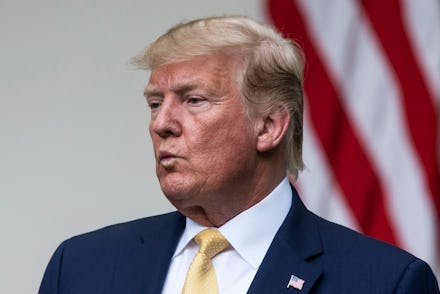Trump kills off committees on marine wildlife, invasive species

The Trump administration is once again cutting back on scientific expertise. This time, the decision comes at the expense of our marine wildlife and efforts to combat the damages done by invasive species. According to a report from The Hill, the Trump administration will defund two environmental committees: the National Oceanic and Atmospheric Administration (NOAA)'s Marine Protected Areas Federal Advisory Committee or the Interior Department’s Invasive Species Advisory Committee.
These two committees aren't new, unnecessary expenditures that have become a burden on the government or a waste of taxpayer dollars. The Marine Protected Areas Federal Advisory Committee was first formed in 2003 under President George W. Bush, while the Invasive Species Advisory Committee started in 1999 under President Bill Clinton. Members serving on the Invasive Species Advisory Committee at least were given a bit of a heads up, warned on May 2 of this year that the board's charter would end. According to The Hill, members of the Marine Protected Areas Federal Advisory Committee weren't so lucky: they were made aware that their board would be disbanded on Monday and were provided no additional information about the decision.
Given the way the Trump administration operates — by completely dismissing any scientific understanding about the delicate balance of ecosystems and the importance of protecting lands and the plants and animals that occupy them — the elimination of these boards makes total sense. NOAA's marine wildlife committee was tasked with advising the government agency on how to best preserve the more than 1,700 marine protected areas around the country. Those areas make up about 41 percent of marine waters in the U.S. Trump and his administration cohorts, many of whom have backgrounds in the oil and energy industry, have no use for such areas. In fact, the president signed an executive order in 2017 instructing the Commerce Department to start reviewing marine areas that were given protected status after 2007 and determine if they should be re-opened for offshore oil drilling. Similarly, Ryan Zinke — the former Secretary of the Interior who resigned in the face of multiple ethics investigations — advised the administration to reduce the size of protected areas around national monuments so the land could be used to increase coal, oil and gas mining access. If your plan is to simply violate those protected areas, there's no real need for the committee that informs you how to best protect them, now is there?
As for the Interior Department’s Invasive Species Advisory Committee, it appears to be the victim of broader budget cuts. The board is part of the National Invasive Species Council, which is expecting to have its budget cut in half next year. This all falls in line with the administration's willful ignorance toward the effects of invasive species. Shortly after taking office, Trump delayed indefinitely a plan developed by the U.S. Army Corp of Engineers to protect the Great Lakes from invasive Asian carp, a species of fish that poses a significant threat to plants and animals native to the bodies of water. The administration gave no real justification for the decision. The President followed up that decision by announcing his administration's 2018 budget, which eliminated $300 million that was intended to go to funding the restoration of the Great Lakes, including expanded efforts to fight the presence of invasive species. Ignoring the effects of invasive species does far more harm than good. These unwelcome plants and animals can be responsible for ruining biodiversity in affected regions, limiting access to natural resources, lowering the value of land and harming the productivity of crops and livestock. But if you simply don't care about these things, or view it as a waste of money and resources to invest in, then you certainly wouldn't bother to continue to pay a group of experts that you'd just ignore anyway.
The scary and worst part of every Trump administration decision is that there is a logic to it, perverse as it might be. Trump and his cabinet have made it abundantly clear that they do not care about science. They have disregarded every bit of information that is not convenient to their agenda of expanding energy production including drilling for natural gas and mining for coal. They have ignored and denied the scientific consensus that climate change is real and influenced by humans. They have slashed every advisory board imaginable that may provide pushback on these ideas, and the ones that they have kept are now packed with industry shills and yes men who will back up the administration's positions no matter how objectively wrong they may be. Trump and his team will continue to sideline scientists at every turn because they honestly just have no use for them. If your goal was to account for science — take under consideration the potential adverse effects of drilling in protected regions or the damages caused by invasive species — then you would make sure that boards of experts on those very topics are not only fully funded but have a clear voice in your decision-making process. If you know full well that you're going to dismiss any bit of information those committees produce that don't reinforce your existing worldview and vested interest in the fossil fuel industry, then why spend the money?